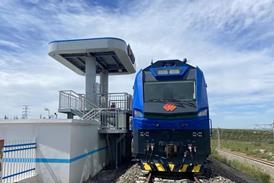NETHERLANDS: The European Parliament may have backed away from proposals to liberalise the operation of domestic passenger trains before 2017, as proposed in the Third Railway Package, but private-sector concessionaires may try to force the pace of change, starting with a forthcoming legal challenge in the Netherlands.
 The country's largest bus operator Connexxion is planning to go to court in an attempt to break the NS monopoly of passenger services on the defined 'core routes' amounting to 92% of the national network. Extended in 2006, this contract is due to run until at least 2015.
The country's largest bus operator Connexxion is planning to go to court in an attempt to break the NS monopoly of passenger services on the defined 'core routes' amounting to 92% of the national network. Extended in 2006, this contract is due to run until at least 2015.
Connexxion holds two concessions to run regional passenger services on the Almelo - Mariënberg and Amersfoort - Ede Wageningen branches. But it has ambitions to launch inter-city services, and says it 'is very interested in running trains on the core network'. Spokesman Herman Opmeer confirmed that Connexxion is preparing to challenge the NS monopoly, both in the courts and with the Competition Commission.
There are suggestions that Connexxion's sudden interest in running inter-city trains may be a direct response to NS plans to set up a subsidiary to run regional bus services. Most provinces are increasingly choosing to award co-ordinated concessions for the operation of both bus and train services. NS has either backed away from combined tenders or found a bidding partner to provide the bus element, although such partnerships have been notably unsuccessful.
Setting up its own bus subsidiary would better position NS to bid for regional concessions. But Connexxion believes it would make the bidding unfair, because NS enjoys a monopoly on the core network whereas none of its competitors has any protection in either the bus or rail sectors. Ironically, part of Connexxion's bus business used to belong to NS, and although the company was privatised last year, the state still holds a one-third stake. The majority owner is a consortium of Transdev and Bank Nederlandse Gemeenten.
If the courts rule in favour of competition, the government will be faced with accommodating private operators on ProRail's increasingly crowded network. It could move towards open-access competition on the core network, or break up the existing operations into a series of contracts and put them out for competitive bidding. The recent timetable reforms designed to reduce the complexity of inter-regional operations and group services into simpler blocks could actually make such a break-up easier to implement.

















